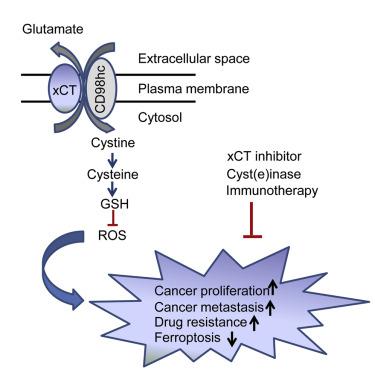Molecular Therapy ( IF 12.1 ) Pub Date : 2020-09-02 , DOI: 10.1016/j.ymthe.2020.08.021 Jinyun Liu 1 , Xiaojun Xia 2 , Peng Huang 1

|
System xc− cystine/glutamate antiporter, composed of a light-chain subunit (xCT, SLC7A11) and a heavy-chain subunit (CD98hc, SLC3A2), is mainly responsible for the cellular uptake of cystine in exchange for intracellular glutamate. In recent years, the xCT molecule has been found to play an important role in tumor growth, progression, metastasis, and multidrug resistance in various types of cancer. Interestingly, xCT also exhibits an essential function in regulating tumor-associated ferroptosis. Despite significant progress in targeting the system xc− transporter in cancer treatment, the underlying mechanisms still remain elusive. It is also unclear why solid tumors are more sensitive to xCT inhibitors such as sulfasalazine, as compared to hematological malignancies. This review mainly focuses on the role of xCT cystine/glutamate transporter in regard to tumor growth, chemoresistance, tumor-selective ferroptosis, and the mechanisms regulating xCT gene expression. The potential therapeutic implications of targeting the system xc− and its combination with chemotherapeutic agents or immunotherapy to suppress tumor growth and overcome drug resistance are also discussed.
中文翻译:

xCT:一种将癌症代谢与氧化还原信号联系起来的关键分子。
System x c -胱氨酸/谷氨酸逆向转运蛋白,由轻链亚基(xCT,SLC7A11)和重链亚基(CD98hc,SLC3A2)组成,主要负责胱氨酸的细胞摄取以换取细胞内谷氨酸。近年来,已发现 xCT 分子在各种类型癌症的肿瘤生长、进展、转移和多药耐药性中发挥重要作用。有趣的是,xCT 在调节肿瘤相关的铁死亡中也表现出重要的功能。尽管在针对系统 x c方面取得了重大进展-癌症治疗中的转运蛋白,其潜在机制仍然难以捉摸。与血液系统恶性肿瘤相比,为什么实体瘤对柳氮磺吡啶等 xCT 抑制剂更敏感也不清楚。本综述主要关注 xCT 胱氨酸/谷氨酸转运蛋白在肿瘤生长、化学抗性、肿瘤选择性铁死亡和调节xCT基因表达的机制方面的作用。还讨论了靶向系统 x c -及其与化学治疗剂或免疫疗法的组合以抑制肿瘤生长和克服耐药性的潜在治疗意义。































 京公网安备 11010802027423号
京公网安备 11010802027423号